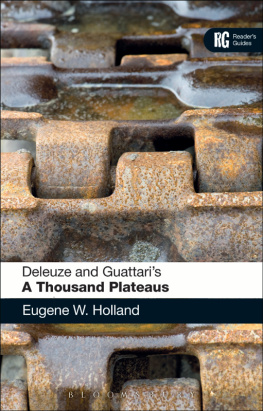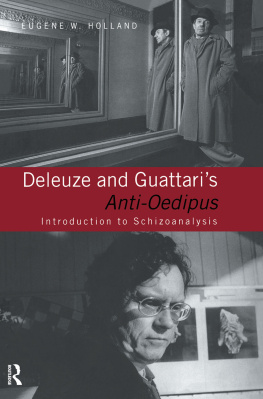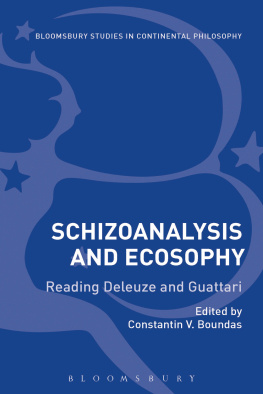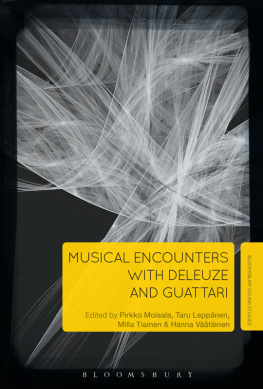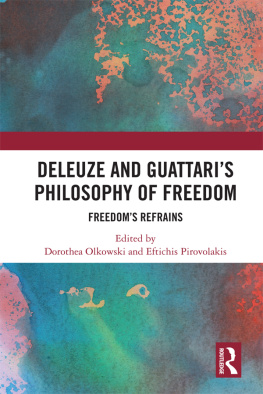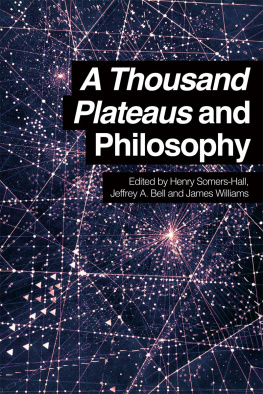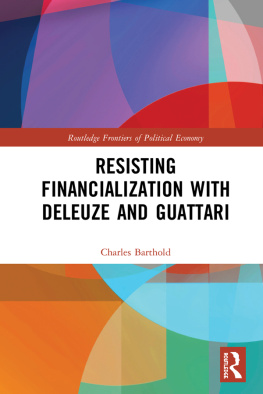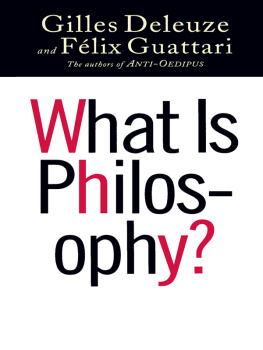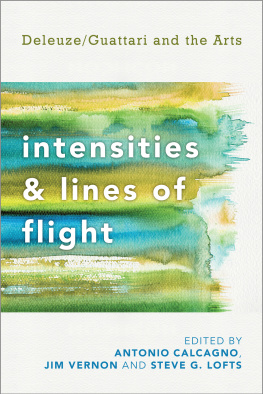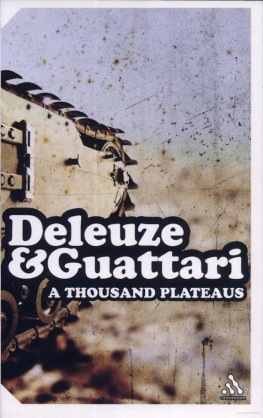READERS GUIDES
Bloomsbury Readers Guides are clear, concise and accessible introductions to key texts in literature and philosophy. Each book explores the themes, context, criticism and influence of key works, providing a practical introduction to close reading, guiding students towards a thorough understanding of the text. They provide an essential, up-to-date resource, ideal for undergraduate students.
Readers Guides available
Aristotles Metaphysics, Edward Halper
Aristotles Politics, Judith A. Swanson and C. David Corbin
Badious Being and Event, Christopher Norris
Berkeleys Principles of Human Knowledge, Alasdair Richmond
Berkeleys Three Dialogues, Aaron Garrett
Deleuze and Guattaris What is Philosophy?, Rex Butler
Deleuzes Difference and Repetition, Joe Hughes
Derridas Writing and Difference, Sarah Wood
Hegels Phenomenology of Spirit, Stephen Houlgate
Heideggers Later Writings, Lee Braver
Humes Enquiry Concerning Human Understanding, Alan Bailey and Dan OBrien
Kants Critique of Aesthetic Judgement, Fiona Hughes
Kierkegaards Fear and Trembling, Clare Carlisle
Kuhns The Structure of Scientific Revolutions, John Preston
Lockes Essay Concerning Human Understanding, William Uzgalis
Machiavellis The Prince, Miguel Vatter
Mills Utilitarianism, Henry R. West
Nietzsches Beyond Good and Evil, Christa Davis Acampora and Keith Ansell Pearson
Nietzsches The Birth of Tragedy, Douglas Burnham and Martin Jesinghausen
Nietzsches Thus Spoke Zarathustra, Clancy Martin and Daw-Nay Evans
Platos Republic, Luke Purshouse
Platos Symposium, Thomas L. Cooksey
Rawlss A Theory of Justice, Frank Lovett
Sartres Being and Nothingness, Sebastian Gardner
Schopenhauers The World as Will and Representation, Robert L. Wicks
Wittgensteins Philosophical Investigations, Arif Ahmed
A READERS GUIDE
Deleuze and Guattaris A Thousand Plateaus
EUGENE W. HOLLAND

Bloomsbury Academic
An imprint of Bloomsbury Publishing Plc

Visit www.bloomsbury.com to find out more about our authors and their books.
You will find extracts, author interviews, author events and you can sign up for newsletters to be the first to hear about our latest releases and special offers
Bloomsbury is a registered trade mark of Bloomsbury Publishing Plc
First published 2013
Eugene W. Holland, 2013
All rights reserved. No part of this publication may be reproduced or transmitted in any form or by any means, electronic or mechanical, including photocopying, recording, or any information storage or retrieval system, without prior permission in writing from the publishers.
Eugene W. Holland has asserted his right under the Copyright, Designs and Patents Act, 1988, to be identified as Author of this work.
No responsibility for loss caused to any individual or organization acting on or refraining from action as a result of the material in this publication can be accepted by Bloomsbury Academic or the author.
British Library Cataloguing-in-Publication Data
A catalogue record for this book is available from the British Library.
ISBN: ePub: 9781441112309
Library of Congress Cataloging-in-Publication Data
Holland, Eugene W.
Deleuze and Guattaris A thousand plateaus : a readers guide / Eugene W. Holland.
pages cm. -- (Readers guides)
Includes bibliographical references and index.
ISBN 978-0-8264-2302-3 (pbk. : alk. paper) -- ISBN 978-0-8264-6576-4 (hardcover : alk. paper) -- ISBN 978-1-4411-6250-2 (ebook (pdf)) -- ISBN 978-1-4411-1230-9 (ebook (epub)) 1. Deleuze, Gilles, 1925-1995. Mille plateaux. 2. Philosophy. 3. Psychoanalysis. 4. Radicalism. 5. Postmodernism. 6. Deleuze, Gilles, 1925-1995. 7. Guattari, Felix, 1930-1992. I. Title.
B77.D43H65 2013
194--dc23
2013015956
Typeset by Fakenham Prepress Solutions, Fakenham, Norfolk NR21 8NN
I would like to thank the following for their helpful feedback on this project in various stages of its development: the students in my seminars at Ohio State (2010) and UC Irvine (2012); the organizers and participants at the Philosophy and Literature Conference at Purdue University (2010), the Fourth International Deleuze Studies conference in Copenhagen, Denmark (2011), and the Kaifeng International Deleuze Conference in Kaifeng, China (2012); Sarah Campbell and her successors at Continuum/Bloomsbury Academic; and, as always, my inimitable in-house editor and interlocutor, Eliza Segura-Holland.
Columbus, Ohio
Newport Beach, California
Author note: All page references following quotations in the text refer to A Thousand Plateaus unless indicated otherwise.
Deleuze and Guattari burst onto the intellectual scene as collaborators with the first volume of Capitalism and Schizophrenia, entitled Anti-Oedipus, in 1972; the second volume, A Thousand Plateaus, followed eight years later. In between the two volumes of Capitalism and Schizophrenia, they co-authored Kafka: Toward a Minor Literature, whose importance for A Thousand Plateaus can hardly be exaggerated. Their last collaborative work, What is Philosophy?, appeared in 1991 (just before Guattaris death in 1992 and not long before Deleuzes suicide in 1995); among other things, it makes explicit the conception of philosophy they shared and had been practicing together for two decades. These other jointly-authored works provide important contexts for understanding A Thousand Plateaus, but so do their singly-authored works, particularly those of Deleuze. Although Deleuze was only five years older, he was a well-established philosopher when the two met in 1969, with many books to his credit and a growing reputation as one of the most important poststructuralist philosophers in France. Indeed, one of the things that attracted Guattari to Deleuze (for it was Guattari who proposed that they meet) was his command of western philosophy. Although Guattari had published just a few academic articles when they met (along with many more journalistic pieces), he was not only a star student and trainee of the reigning French psychoanalyst, Jacques Lacan, but co-director of one of the most radical psychiatric clinics in France, and also a militant political activist; it was Deleuze who suggested they work together. Each of them felt that the other could help them advance their work in ways they couldnt do alone, and the result was a unique and extraordinarily fertile collaboration that produced some of the most astonishing and important works of philosophy in the 20th century. After brief biographical sketches of the two authors, I will situate A Thousand Plateaus in its historical and philosophical contexts.
Gilles Deleuze
Born in 1925 to middle-class parents, Deleuze became enamored of literature and then philosophy in high school during WWII, and received his agrgation in philosophy in 1948. After teaching high school (lyce) for a number of years, he taught at the Sorbonne, held a position at the CNRS (National Center for Scientific Research) from 1960 until 1964, then returned to teaching at the University of Lyons until the completion of his doctorate in 1968, after which he was appointed to the faculty at the experimental University of Paris at Vincennes, where he taught (along with Michel Foucault, Guattari, and Lacan, among others) until he retired in 1987.
Next page
